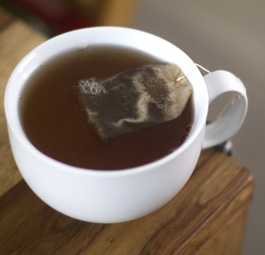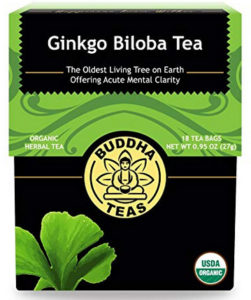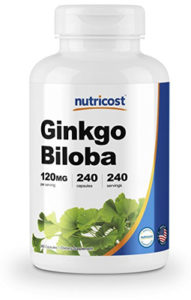Ginkgo Biloba Tea and the Health Benefits of Ginkgo

Age related problems, such as memory loss and dementia can already start to be a huge problem if you have turned 45, 50, or 55. In addition, old age may also bring a condition called tinnitus, or ear ringing. Both of these unpleasant medical problems can be improved, if not totally cured by taking an ancient, almost magical plant called Ginkgo Biloba.
Ginkgo Biloba is a tree from the Gingkoaceae family. This plant is one of the oldest species of trees on our planet. A ginkgo tree can live up to one thousand years and get to the height of 35 meters. The fruits of this tree are not eatable, its seed can be poisonous, but the leaves contain a wealth of nutritious substances.
Ginkgo and its healing properties have been known to the Chinese people for thousands of years. Modern research confirms the many beneficial effects of the Ginkgo’s green leaves and its extract.
Let’s see very briefly what the most important nutrients of Ginkgo biloba are:
Table of Contents
What Does Ginkgo Extract Contain?
Ginkgo is abundant in more than 40 bio-chemical compounds, but it is widely believed that 2 categories are the most important with regard to healing properties: terpenoids and flavonoids.
Terpenoids are known to produce blood vessels dilation and help improve blood flow. Flavonoids are protectors of the bodily cells and tissues, especially in the area of the heart muscle, nervous system and eye health.
Other important phytonutrients in this plant are phyto-phenols, and pro-anthocyanidins. They are all potent anti-oxidants with strong biological action on the blood vessels and brain cells.
Health Benefits of Ginkgo
 As already mentioned, the most important use of Ginkgo is to improve the cognitive functioning of the brain. What exactly does this mean? It means that in the presence of Ginkgo nutrients, the brain cells can more easily nourish on glucose and take in oxygen for their normal metabolic function. In addition to that, Ginkgo protects and strengthens the brain’s blood vessels.
As already mentioned, the most important use of Ginkgo is to improve the cognitive functioning of the brain. What exactly does this mean? It means that in the presence of Ginkgo nutrients, the brain cells can more easily nourish on glucose and take in oxygen for their normal metabolic function. In addition to that, Ginkgo protects and strengthens the brain’s blood vessels.
As a result of this micro-nurturing, the brain as a whole can function much better. The brain’s ability to focus and concentrate is improved, and all this translates into better attention and memory.
So Ginkgo may be helpful for people with dementia, cognitive decline, and Alzheimer’s disease.
In addition to this cognitive improving action, Ginkgo may help with anxiety, fatigue, stress, depression, PMS, tinnitus, inflammation, blood flow, sexual dysfunction, and vision decline.
Ginkgo can be very effective in dealing with anxiety and depression. It can also help in cases of mood disorder and improve your general energy and enthusiasm. There is research confirming this usefulness. This article, for example, reviews the effectiveness of Ginkgo in case of unipolar depression.
It is worth mentioning, that in the case of depression, you should always consult your doctor. However, if the depression is mild, your doctor may also suggest using Ginkgo Biloba supplementation (see below).
Ginkgo’s neuroprotective action is due to the active ingredients (known as EGb761 extract) extracted from the leaves of Ginkgo Biloba. This extract is a well-defined blend containing active compounds from Ginkgo leaves.
The standardized ginkgo extract can be used to treat PMS. According to some recent studies, Ginkgo Biloba appears to be one of the most effective plants for treating of PMS, especially with regards to reducing the severity the PMS symptoms in women.
Another condition where Ginkgo can help is Tinnitus (ear ringing). In fact, Ginkgo is probably the only herbal medicine that can help in this regard. A recent systematic review has shown the efficiency of using Ginkgo extract for alleviating the symptoms of tinnitus in patients with tinnitus as primary condition and patients with cognitive decline problems.
Ginkgo extract has been shown to improve the cerebral blood flow (CBF) in the brain. A recent study has determined the effect of Ginkgo extract on CBF by conducting dynamic susceptibility contrast-enhanced magnetic resonance imaging. Moreover, it has a vasoprotective effect, protecting the blood vessels in the brain and alleviates ischemic problems.
Ginkgo may improve vision in some instances of glaucoma and vision decline which is age related. This is most probably due to the Ginkgo’s ability to enhance blood flow in the brain. Patients treated with ginkgo extract in controlled studies showed significant improvement of their visual field.
Another of Ginkgo’s potential uses is in reducing inflammation pain. Ginkgo’s extract is rich in bilobalides, unique compounds that are believed to inhibit inflammation in cases of acute pain. These biological compounds may reduce elevated temperature and pain caused by inflammation.
Besides, Ginkgo has decent anti-bacterial properties. This is a side effect of the aforementioned bilobalides. These biological compounds can eradicate bacteria from the Pneumocystis carinii strains, leaving no toxicity behind.
Proper Usage of Ginkgo Biloba
There are two basic ways you can use Ginkgo: as natural supplement (extract) or as tea. In either case, make sure you have contacted your doctor because of the possible side effects and contraindications.

The side effects may include diarrhea, nausea, stomach ache, dizziness, even vomiting and headaches. If you have a sensitive digestive system, you may want to skip using tea and try with small dosages of supplements.
However, Ginkgo Biloba is well tolerated among the majority of population. It is very unlikely that the ginkgo extracts may give you any side effects if you follow the recommended doses.
How to Make a Ginkgo Tea at Home
You can use fresh leaves of ginkgo to prepare tea the same way as any other tea is made.
 For example, you can take one tea spoon of fresh or dried Gingko leaves. You will also need a cup of boiled water. Just pour the water on top of the leaves and steep for a period of 5 to 10 minutes. Strain the leaves and wait for the liquid to cool. Add some lemon juice to the tea if you prefer to use it that way, and your Ginkgo Tea is ready.
For example, you can take one tea spoon of fresh or dried Gingko leaves. You will also need a cup of boiled water. Just pour the water on top of the leaves and steep for a period of 5 to 10 minutes. Strain the leaves and wait for the liquid to cool. Add some lemon juice to the tea if you prefer to use it that way, and your Ginkgo Tea is ready.
You can also buy Organic Gingko Biloba Tea in bleach free bags, ready to be used. For example, this brand is a good source of natural antioxidants, without additives, caffeine, GMO, or gluten. On top of that the bags are biodegradable.
But even better than using bags, is using fresh leaves, bulk organic, cut and sifted.
They are leaves, not powder, which are much more finely cut, excellent for preparing tea.
 The recommended dosage of Ginkgo Biloba extract is up to 250 mg per day.
The recommended dosage of Ginkgo Biloba extract is up to 250 mg per day.
If you want to try Ginkgo extract, there are many excellent supplements on the market. We recommend the Nutricost Ginkgo Biloba. It comes in capsules, 120 mg of gluten free, non-gmo extract each.
Possible Contra-indications
Special precautions are needed with people who use anti-coagulants and anti-platelet drugs. They should take ginkgo simultaneously with these drugs as it may increase bleeding risk.
Ginkgo is a blood thinner, so people using prescription drugs for blood thinning, should not take it at the same time.
Ginkgo may not be the best choice if you are pregnant because it may prolong bleeding during labor.
Ginkgo has similar allergenic chemical to the ones found in mango, pistachios, cashew, and poison ivy. So if you are allergic to any of the above plants, you may want to avoid using ginkgo in any form.
The Bottom Line
Ginkgo is an ancient plant whose medicinal properties are well known and proven. Since a long time ago, the extract from the leaves of this tree has been used to improve health in general. It has been used in the past, and it is used today to:
increase blood circulation in the brain and extremities,
prevent headache and vertigo,
improve memory and concentration due to the better blood supply of the brain,
improve the cognitive function of the brain,
prevent cognitive deterioration due to old age,
help neutralize free radicals on a cellular level,
alleviate problems with the ears, such as tinnitus,
strengthen the blood vessels and prevents the creation of arterial plague,
boost energy, and protect the nervous system.
If you suffer from any of the above problems, you might give Ginkgo tea or supplement a try, of course in cooperation and under supervision of your physician. Being a fully natural product, you have very little to lose and potentially a lot to gain. To your health.

Leave a comment